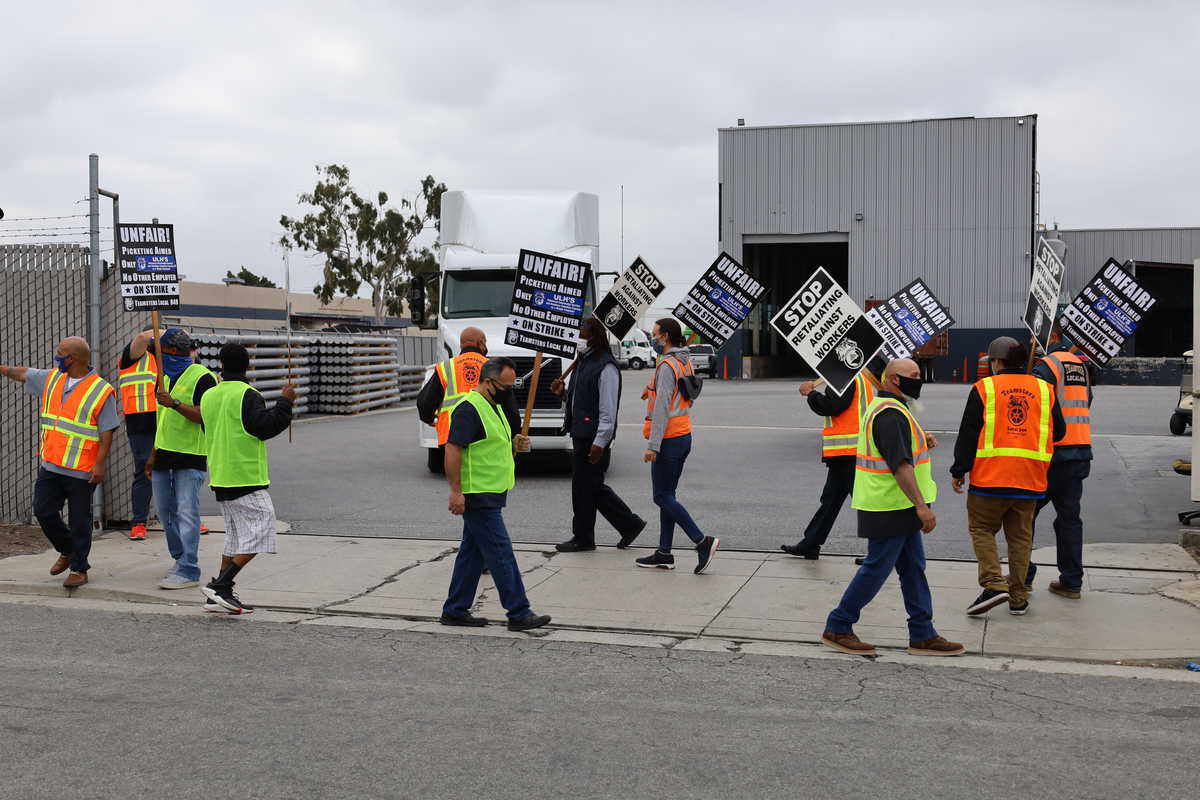The Teamsters are calling it a strike, but an action at a Universal Logistics (NASDAQ: ULH) facility in Compton, California, Monday is more of a protest by workers who want their job back.
Though the protest was small, it’s another battle in the ongoing California labor wars, where the intersection of Teamster efforts to unionize and issues of driver classification all come together. Looming in the background at all times are California’s regulations dealing with the issue of worker classification.
Developments in the California legal structure governing transportation got slightly more complex last week, with a press conference to introduce to the public legislation that would impact the drayage industry in the state.
The demonstration in front of the Southern Counties Express division of Universal Logistics was a small gathering, based on a photo provided by the Teamsters. It is believed that none of the protesters were employed workers from the logistics facility.
But it is being viewed as an extension of an ongoing dispute at Universal Logistics that has brought in the National Labor Relations Board. Last month, the NLRB filed a complaint against various Universal Logistics activities, stemming from the closure of the Universal Intermodal facility, also at Compton, after workers there voted to be represented by the Teamsters union.
The union was certified to represent workers there in January 2020, but several weeks earlier, Universal Logistics implemented a sweeping layoff that eliminated the jobs of the Universal Intermodal workers at Compton as well as at Universal Truckload Services and Roadrunner Intermodal Services, which Universal had recently acquired.
The Teamsters, in a press release touting the action at Compton, described it as a “strike,” despite the fact that the workers who mounted the protest do not appear to actually have jobs at the site. However, the union also believes the workers were targeted unfairly — hence their own complaints to the NLRB, and the follow-up action by the board itself — so it serves to emphasize that point if the action is described as a “strike.”
“Drivers are demanding that a family of trucking companies owned by Universal Logistics Holdings … follow the law, reinstate the unit of illegally fired drivers with back pay, respect drivers’ right to form a union, bargain in good faith for a collective-bargaining agreement and cease misclassifying drivers as independent contractors,” the union said in its statement.
An email query to Universal Logistics’ investor relations department had not been responded to by publication time.
In the NLRB complaint, the board said it seeks an order that would bring back the shuttered activities at Compton and require Universal to “bargain in good faith.” The union, in the press release about the protest, said there were “nascent” unionization efforts at the shuttered facilities besides the Compton division that had voted to be represented by the Teamsters.
Even if the protest/strike had no immediate goal, it is another salvo in the employee classification battle in California, an issue for the trucking industry that could become massively more significant in the coming weeks or months if a federal appeals court rules that the injunction keeping AB5 out of the state’s trucking industry is invalid.
What the union says is misclassification was driven home by another part of its press release. “The COVID-19 pandemic has illustrated the crisis of misclassified drivers being denied basic protections like sick leave, unemployment insurance, disability insurance, worker compensation, and health insurance because of their misclassification as independent contractors,” it said.
The question of classification and related employment issues for the Southern California drayage sector has come up in recent weeks with the introduction of several pieces of legislation in the California legislature this term. They were highlighted last week in a press conference on the steps of the state Capitol attended by several union representatives as well as workers, along with the authors of the bills.
The most notable for the industry is one introduced by Sen. Lena Gonzalez, not to be confused with Assemblywoman Lorena Gonzalez, the author of AB5.
Lena Gonzalez — whose Wikipedia entry says represents Long Beach and who is the daughter of a unionized truck driver — has proposed legislation calling for more disclosure of the identity of drayage companies that violate various regulations, and then provide a means to punish shippers that use those companies’ services.
The goal, according to the legislation, is “holding customers of trucking companies jointly liable for future labor, employment, and health and safety law violations by port drayage motor carriers whom they engage and of whose prior violations of labor, employment, or health and safety laws the customers received advance notice will exert pressure across the supply chain to protect drayage drivers from further exploitation.”
Under the bill, a customer that uses a drayage company on that list could find itself a party to the “civil legal responsibility … owed to the state” by the drayage company, “including … tax assessments and civil liability stemming from the motor carrier’s failure to comply with applicable health and safety laws, rules, or regulations.”
The other legislation touted at the Capitol steps press conference is a bill introduced by Assemblywoman Wendy Carrillo, which would require the California Air Resources Board to set up additional grants and other incentives to purchase clean vehicles, and a bill introduced by Sen. Maria Elena Durazo, which would help what the bill described as “misclassified drivers” gain access to unemployment benefits and mandate that companies found to have misclassified drivers be responsible for payroll taxes.
More articles by John Kingston
Big premium on sale of ORBCOMM didn’t catch everyone by surprise
Towing fraud, staged accidents targeted by new coalition that includes ATA
E2open, newly public, gives guidance on finances, near earlier targets












Donald Starr
So is this strike settled now? Has it been settled and drivers are back to work?